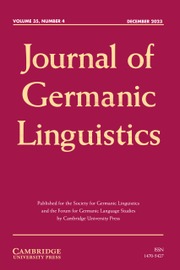Article contents
Ground Arguments in German Particle Verbs: A Comparison with Dutch and English
Published online by Cambridge University Press: 01 September 2009
Abstract
I discuss the following three topics with respect to German particle verbs with a ground argument. First, I consider the difference between anlächeln and zulächeln ‘smile at’ in German. In the former the accusative argument represents a ground, whereas in the latter the dative argument is licensed by inalienable semantics. Second, I discuss why a ground can be expressed by a dative in the German verb zueilen ‘hurry toward’, whereas in the corresponding Dutch verb toesnelln the preposition naar or op ‘to’ is necessary. This difference is due to the fact that German has a low dative. Finally, I consider the question of why expressions like ∗pour the glass in or ∗load the truck on are not allowed in English, whereas the corresponding expressions are possible in German and Dutch. This results from a difference in the syntactic structure of particle verbs in the languages.*
- Type
- ARTICLES
- Information
- Copyright
- Copyright © Society for Germanic Linguistics 2009
References
REFERENCES
- 2
- Cited by


